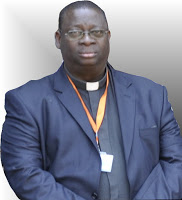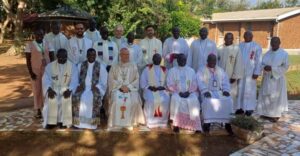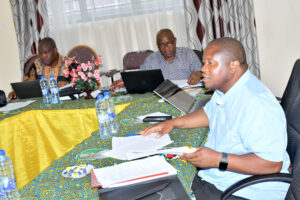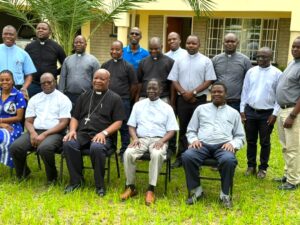ZAMBIA: Two years into Episcopacy, Bishop of Monze talks about tough challenges the Diocese is battling with

Two years after his episcopal ordination, the former Coordinator of AMECEA Social Communications Department Rt. Rev. Moses Hamungole has talked about the tough challenges he has to face head-on as he strives to steer the Diocese of Monze to the next level. Speaking to AMECEA Online News when he recently attended a Capacity Building workshop organized by AMECEA in Nairobi; Bishop Hamungole said that the greatest need for the diocese is to deepen evangelization.
“Monze has a strong foundation of Adventist Church which has penetrated into deeper areas that we Catholics have not put up anything. The diocese is also a strong base of the Salvation Army Church and these groups have penetrated deep into the areas that as Catholic Church we have never reached and it will take us another 20 years to reach there,” he said.
According to Bishop Hamungole who celebrated the second anniversary of his Episcopacy in May 2016, there are certain areas in the diocese where the nearest parish or outstation is situated tens of miles away. “In certain places where it would take people more than three hours to reach a parish or an outstation, where Mass is not even possible every Sunday, the majority would opt to go to the nearby protestant churches.”
Bishop Hamungole also talked about the rapid loss of Catholic youth to the protestant churches, a situation he attributed to the fact that Catholic Schools which acted as places for Catholic formation no longer exist.
“The diocese of Monze was started by the Jesuits who opened many schools through which we could do catechesis and Catholic formation. Around 1972-1973, the government took over most of the mission schools and we lost control. They send in all kinds of teachers, some from Pentecostal churches, others Adventists therefore the schools are no longer places of evangelization as they used to be,” he explained.
However, Bishop Hamungole’s greatest fear is the practice of multiple religions all at the same time. “When you read Ecclesia in Africa, among the issues discussed by the Synod Fathers was the characteristic of African Christians with one leg in the church and the other on land,” the Bishop pointed out adding that the practice is very much alive in the diocese and is one of the biggest challenges they are trying to overcome.
“I have been to parishes where I am told that Christians have a dual or trio membership; this means that some of our very strong Christians would attend the Sunday Mass in the morning because they believe it is obligatory, then in the afternoon they would go to a Pentecostal fellowship and later in the evening, they would visit a witch-doctor or traditional medicine men, for one reason or the other.”
He explained that the situation is brought about by the fact that people’s faith is not deep enough and many Catholics feel unaccompanied as well as not feel satisfied with the evangelization of the Catholic Church.
Meanwhile he also blames the media for fuelling beliefs in witchcraft and superstitions whereby many people seem to be obsessed with the idea of devil worship and attribute any misfortune such as accidents to devil worship sacrifices.
“There is a mentality that anybody who is seen to be rich is a devil worshiper and a lot of fear is attached to this. People are afraid to work hard and gain wealth to avoid being accused of devil worshiping,” he explained adding that the diocese is currently trying to address the issue by encouraging people to stop wasting their time looking answers in myths whose basis are unfounded.
By Pamela Adinda, AMECEA Online News


